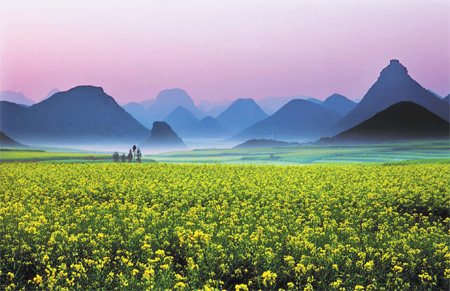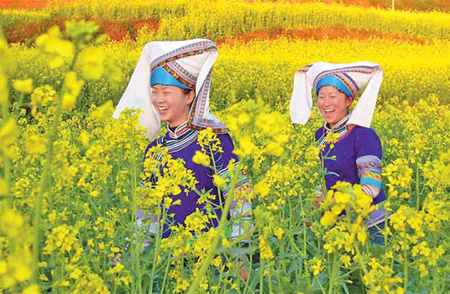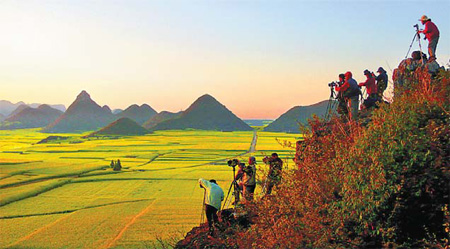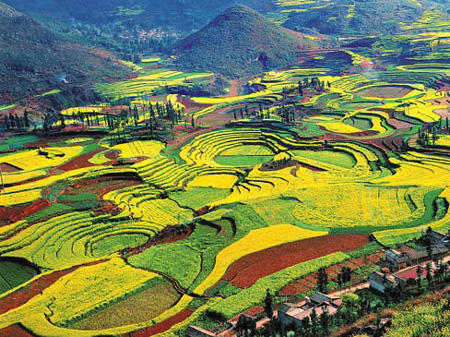Flower power
|
Fields of blooming rapeseed flowers are bathed in the morning sunlight in Luoping, Yunnan province, which is known for its unique karst landscape. [Photo/China Daily] |
|
Two Bouyei women wander through the fields.?[Photo/China Daily] |

Vast swathes of rapeseed blooms have helped the economy of a previously destitute county in Yunnan blossom. Guo Anfei and Li Yingqing report.
While much of northern China was blanketed in snow in February, early spring had painted the fields of Yunnan province's Luoping county in brilliant yellow, as millions of rapeseed flowers bloomed.
Located on the borders of Yunnan, Guangxi and Guizhou provinces, Luoping has long lured tourists with its unique karst landscapes. The basins dimpling mountain ranges are inhabited by the Yi and Bouyei ethnic groups. But its biggest draw is its 430,000 hectares of rapeseed, said to comprise Southwest China's largest plantation.
Sprawling farmlands are covered with the flowers, which stretch to the horizon, filling the air with the refreshing smell of spring in early February.
Hordes of tourists from around the world flock to the county every year to enjoy spring's first exhalations. Some call it "the world's biggest garden", while others hail it as "a mecca for photographers".
Li Chunhua, a native of Nanyang city in Central China's Henan province, is one of the countless photographers who come here every spring.
"It's just nice and warm here," says Li, who came to Luoping this year with his wife and daughter.
He is pleased to have taken a plethora of high-quality photos. Those of his daughter clad in traditional ethnic attire and wandering through the flowers are "particularly beautiful", he says.
The local government has organized the annual Rapeseed Flower Festival from February to March since 1998 to encourage tourists.
Director of the county's tourism bureau, Liu Bo, says Luoping received more than 1.17 million tourists in 2010, when profits from the tourism industry reached 880 million yuan ($133.87 million).
The stream of tourists into the county over the past decade has brought transformation to the previously impoverished county.
"About a decade ago, some farmers were too poor to feed themselves," Liu says.
The tourism boom provided more job opportunities. Local farmers started small businesses, such as family hotels or ethnic handicraft production and retail.
"They don't need to worry about food and clothes anymore. Some built their own houses and bought tractors," Liu explains.
Rapeseed not only gives oomph to the local tourism industry's expansion but also is the most important local crop. The flowers grow throughout the country but are harvested at different times of the year, depending on local conditions.
Luoping's rapeseed farmlands are among China's vastest.
Cooking oil can be extracted after the flowers wither, which provides another income source for Luoping's farmers.
Jin Xiaoqi, a 31-year-old farmer in Xiaogeda village, owns 1.2 hectares of rapeseed fields and earns nearly 9,000 yuan ($1,369) a year from the crops.
She also sells engraved bamboo to tourists for 8 yuan to 20 yuan apiece, depending on the size. This brings in another 1,000 yuan a month.
Another way in which rapeseed flowers sweeten life in the county is by fostering honey production.
Spring is the beekeeping and honey-processing season. Waves of bees flit across the vast fields of flowers. Local beekeepers - and many from other places, such as Sichuan and Fujian provinces - set up base in tents among the rapeseed farms every spring.
The 430,000 hectares of rapeseed blooms in Luoping attract myriad bees, which produce 15 million to 20 million tons of honey a year. Local people are now looking to brand the county as a honey production base and increase sales to outside markets.
Luoping Tianyuanmiyu Bee Industry Co Chairman Zhu Hongkun founded his enterprise in 2009. It mainly produces honey, propolis and propolis powder.
His company works with more than 270 beekeepers, who each earn about 80,000 yuan a year on average. Some bring in as much as 200,000 yuan annually, Zhu says.
Who said beauty endowed by nature is not worth a fortune?
|
Photographers flock to Luoping every spring to capture the picture-perfect scenery.?[Photo/China Daily] |
|
Yellow and green fields, woven into each other, spread like a woolen carpet.?[Photo/China Daily] |
(China Daily 03/03/2011 page19)
























